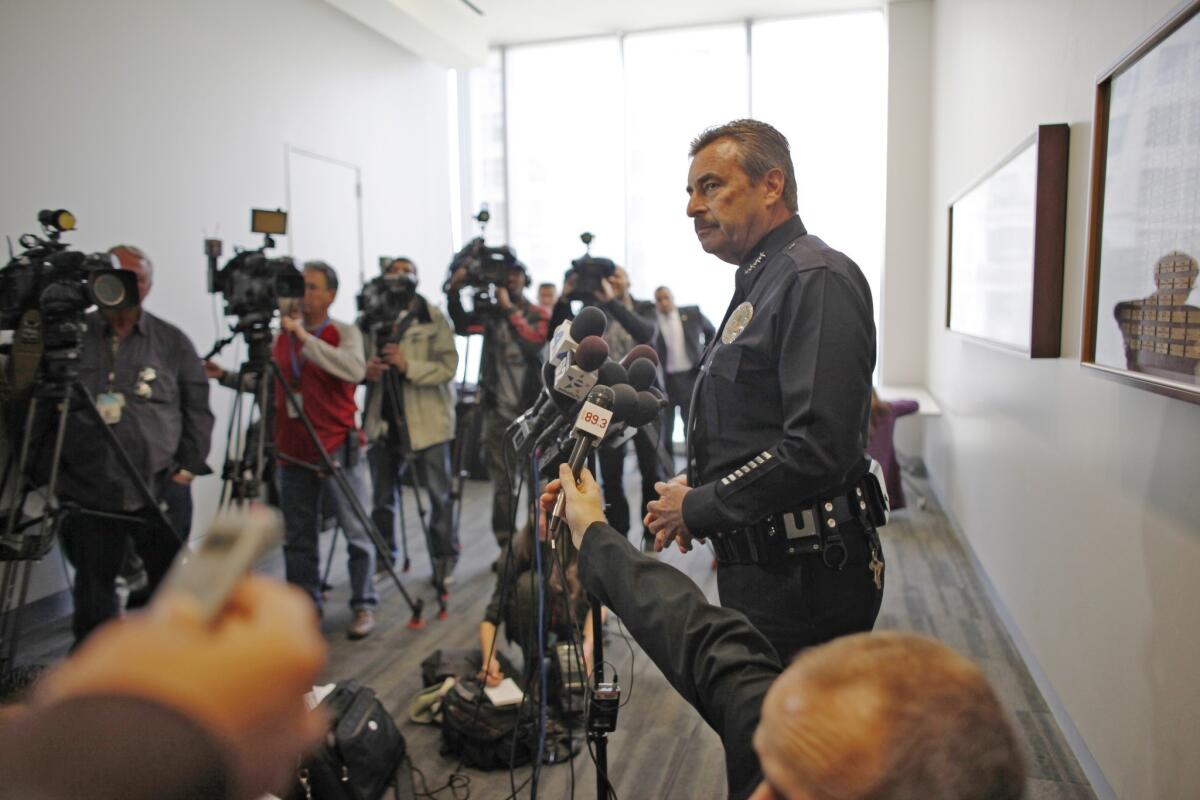Court restores LAPD ban on impounding immigrants’ cars

- Share via
A state appeals court has set aside a lower court’s ruling that struck down the Los Angeles Police Department’s vehicle impound rules.
The decision late Wednesday by a panel of three justices from the California Court of Appeal cleared the way for Police Chief Charlie Beck to reinstate the controversial impound policy he put in place last year to be more lenient on immigrants who are in the country illegally.
In a statement Thursday, Beck said the policy, called Special Order 7, would be put back into place “immediately.”
FOR THE RECORD:
Vehicle impounds: An article in the Oct. 18 LATExtra section about a court ruling reinstating the Los Angeles Police Department’s vehicle impound policy said that unlicensed drivers can avoid having their cars impounded for 30 days if they have not been cited previously for unlicensed driving, among other conditions. The requirement is no prior convictions for the offense. —
Beck was forced to rescind Special Order 7 last month when Los Angeles County Superior Court Judge Terry Green ruled that it was illegal because it attempted to supersede the impound laws set out in the state’s vehicle code.
Green’s decision came in a lawsuit brought by the union that represents the LAPD’s rank-and-file officers. Los Angeles City Atty. Mike Feuer, as well as lawyers for a group of immigrant advocacy organizations that joined in the court fight, vowed to appeal Green’s ruling.
“We are pleased with the court’s decision. We strongly believe that Special Order No. 7 is lawful,” Feuer said in a statement.
In announcing its decision, the appeals court said it was issuing a temporary stay of Green’s ruling that would remain “pending further order of this court.” Still to be decided by the court is whether to keep the stay in effect throughout the entire appeal process, which can last months. A ruling on that is expected late next month.
Under the terms of Special Order 7, if police stop an unlicensed driver who meets several requirements — including having auto insurance, valid identification and no previous citations for unlicensed driving — officers cannot invoke the part of the state vehicle code that authorizes them to confiscate the vehicle for 30 days, a punishment that comes with fines and charges often exceeding $1,200.
In a city with roughly 400,000 immigrants who are in the country illegally and forbidden by state law to obtain driver’s licenses, Beck argued that Special Order 7 was needed for moral and practical reasons.
The 30-day holds, he has said, unfairly burdened such drivers, who are often poor and feel they have no choice but risk having their cars seized to drive to work or take their children to school. When it was implemented, Beck said he expected the policy would encourage unlicensed drivers to take steps that would improve safety, such as buying insurance in an effort to avoid the monthlong holds. It is unclear whether that has occurred.
In its lawsuit, the Police Protective League argued that the order put officers at risk of being held legally liable if an unlicensed driver who would have otherwise had his car held for a month was allowed to keep driving and got into an accident.
“LAPD officers were caught in the middle of a legal controversy over whether they must impound vehicles driven by unlicensed drivers as required by the state vehicle code or follow LAPD Special Order No. 7,” Tyler Izen, president of the union, said earlier. “The LAPPL felt strongly that it was unreasonable and unacceptable to place our membership in this position.”
More to Read
Sign up for Essential California
The most important California stories and recommendations in your inbox every morning.
You may occasionally receive promotional content from the Los Angeles Times.













